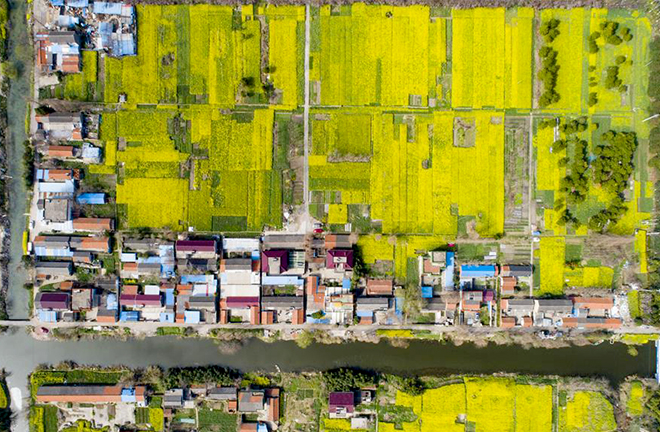Eco-city construction requires multiple approaches

Aerial photo taken on March 22, which shows residential buildings and cole flower fields in Hai ‘an, East China’s Jiangsu Province. Photo: Xu Jinbai/XINHUA
At present, China’s cities have undergone enormous changes, with a rapid increase in population, a growing number and scale of cities, and higher living standards. However, while promoting the economic and social development, urbanization also brings the problems of greater resource shortages and ecological deterioration. In this context, eco-city construction has become a strategy towards urban sustainable development.
Eco-city construction is a systematic project that emphasizes the harmony between living environment and natural environment. To achieve it, the first priority is air management. Urban environmental pollution is mainly caused by air pollution and solid waste pollution. Industrial gas waste and volatile organic compounds are important sources of pollution, easily causing frequent haze and air pollution. Regarding this, we need to establish a joint mechanism for monitoring and preventing combined air pollution especially in key industries, reduce source emissions of nitrogen oxides, and strengthen the prevention and control of ozone. Measures to reduce carbon emissions should be formulated and, meanwhile, clean energy can be developed.
The second priority is sewage collection and disposal infrastructure as well as the recycling of water resources. Through overall planning for road, drainage, sewage and other infrastructure construction, we can establish and improve sewage systems for urban production and life. In this way, the pressure of sewage on the urban ecological environment can be reduced. In addition, the collection, storage and recycling of rainwater is important, and it is necessary to make full use of green roofs and rainwater gardens to regulate flood and waterlogging disasters that strike cities. Real-time dynamic monitoring of pollutant discharge and a timely grasp of the regional water quality and its changes are needed.
The third priority is a green urban network system and low-carbon and circular economy. Ecological space planning should be strengthened. Through developing woodlands, grasslands, wetlands and a public greenbelt, the function of urban green space in regulating climate can be strengthened. As to the green infrastructure system, we should vigorously develop green energy such as solar energy and wind energy, and we must adopt low-carbon ecological technologies for waste treatment. In addition, we should also vigorously develop environmentally friendly industries and energy conservation industries. Innovation in key environmental technologies and products can be bolstered by relying on strategic emerging industries such as those of new materials, biopharmaceuticals and high-end equipment manufacturing. At the same time, low-carbon and green technologies can be used to upgrade traditional industries and reduce energy and resource consumption. Through the practice of green production, manufacturing techniques with high energy consumption and heavy pollution should be gradually eliminated.
The fourth priority is public awareness of environmental protection. To improve the legal system for promoting ecological progress, we should optimize assessment institutions and policies for comprehensive utilization of resources, energy and water conservation, and ecology, so as to realize a green development pattern and lifestyle. Moreover, we should strengthen the intensive use of land resources, actively develop land-saving residences, green and low-carbon transportation systems, and enhance the efficiency of the public transportation system. Third, it is necessary to establish an educational and publicity mechanism for green development to enhance the consciousness and initiative of the whole society in implementing the concept of green development.
Closely related to people’s life safety and health, eco-city construction is an important way to realize ecological progress and a key measure to win the battle against pollution. The COVID-19 outbreak has made us increasingly aware of the importance of eco-cities. In the process of construction, we should pay special attention on protecting sensitive ecological function areas and ecological restoration. We should also integrate economic and social development with ecological progress, and make eco-city construction an important underpinning for high-quality development.
Wu Wenxia and Zhuang Weiguang are respectively the deputy research fellow and research fellow from the Institute of Environment and Development, Guangdong Academy of Social Sciences.
edited by BAI LE
